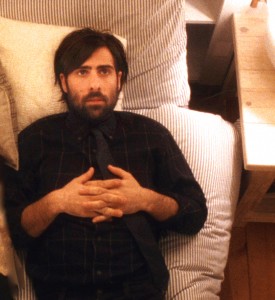
Jason Schwartzman Interview
The ever-comical Jason Schwartzman was in Chicago last Friday, October 24, 2014, promoting his new film Listen Up Philip. He stars as a narcissistic successful book author who irritates anyone that comes in contact with him, including Ashley (Elisabeth Moss), his continually tormented girlfriend. Director and screenplay writer of the film, Alex Ross Perry, shows us a side of Schwartzman that we’ve not seen on screen, illuminating his multifaceted acting chops. We chatted about his role in the film, the Woody Allen similarities in some of the film scenes, his start in acting in the film Rushmore, and his best friend, Wes Anderson.
Sarah Knight Adamson: I’d like to congratulate you on your performance in the film Listen Up Philip. You are so convincing as an antisocial, cranky guy with no filter.
Jason Schwartzman: Oh, thank you so much. I appreciate you saying that.
SKA: At first, it’s a little shocking to view you in this role, I must say, because it’s such a change from the characters you typically play. Did it take some time to really “get into” this narcissistic character?
JS: Yeah, I think that it took a little bit of time, but not in the way where it was like … oh, to feel like this person all the time or something, but it definitely took a little bit of time to just start to think in those ways. I personally could understand a lot of what this character was feeling based on what he’s saying to people. I think we all can relate to wanting to say some of these types of things to people and not really acting on it. The ability to not care what people think about you, as this character does, was one pretty big hurdle.
I would ask Alex, the director, and I would give him hypothetical situations, like “If Philip walked into this situation and this happened, how would he react?” I would show him how I thought it should be and typically was always wrong. The answer that I had in my head was so wrong, and so really it just took a little while to start to think in “Philip logic,” as it were.
Then the other thing that was hard was just this idea that he would take up his idol or his mentor on his invitation to spend time at his house.
SKA: Yes, yes.
JS: That’s just something that I could not understand. If Brian Wilson or Paul McCartney or someone that I love so much said, “Come get out of the city and spend some time at my private residence, and you can write music there on my piano and use my studio,” I would be very shut down by that kind of an offer.
SKA: Yes, that actually leads into my next question because he does say things that some of us are thinking but never would say, and it also … appears, as you were just giving an example, that he makes such terrible decisions.
JS: For sure.
SKA: The script by Alex Ross Perry is very unique in several areas. Let’s talk about the addition of a narrator who’s not your typical voiceover that appears, usually, in films. It’s like a third party. A third party who gives maybe facts or describes Philips’s feelings at times. What do you feel that this added to the film’s tone?
JS: Well, to me, it was great because, for instance, here’s a really clear example. In the opening of the movie, the narrator is telling you who this girl Mona is, who is Philips’s ex-girlfriend.
He gives you their background, and then he also says that she’s running late, which Philip doesn’t like. Then, when you first hear Philip talk, you know already that he’s been waiting, he knows this person, and he’s able to get right into an argument with her, essentially.
If there wasn’t that narrator, it would’ve been impossible to do the scene that way because you would’ve had to have caught everybody up …. on who she was. The narrator sets it up so that there’s less talking about who, what, when, and where. We’re done with that information in the first, like, ten seconds, so we can get into the real meat of it.
SKA: Sure. I found myself really enjoying those scenes with the narrator because it kind of cuts to the chase.
JS: Yeah, for sure.
SKA: I wanted to tell you that I do have a fondness for the name Jason, as my oldest son’s named Jason and Rushmore is one of his favorite movies.
JS: Oh, that’s so cool. It’s so nice to hear that.
SKA: I know you’re asked about Rushmore a lot, but I’d like to hear it from you. What does the film mean to you?
JS: Well, to me, it has this very special reserved spot, which is it was my first time ever acting, and it really began this part of my life that I’m still in, in many ways, and it’s … in all ways, actually. It really was significant because that was when I met Wes Anderson … and meeting Wes and beginning this friendship, which is really a classic kind of mentor/mentee-type dynamics. Meeting him when I was seventeen … That’s still impressionable, and it really was essential for my development for the next years.
It became more than a movie; it became more like the movie was the reason why we were gathered there, but the side effects of it were this friendship and this kind of instruction that became years of recommending movies and authors and exposing me to things that I didn’t know about. He’s still my best friend, and we still work together, and it’s been an evolving relationship as friends and as collaborators. It’s something that … The movie gave me … What do you say? It’s like the movie that gave you not only your start, but also like your best friend.
SKA: Oh, that’s so wonderful. Thank you, Jason, for sharing that. One thing about Wes Anderson; what do you admire in his directing?
JS: I admire in his directing, basically that he has the ability to imagine these environments that are just enough like something that you could really know and then also have their own kind of laws to them. As you start to get to know him more, you realize where it’s coming from is this joy of wanting to experience it.
Like, for example, in Rushmore, the go-kart scene. There were a few go-karts there that day, and Wes was like, “Here, you get in one, I’m going to get in one, and you can follow me.” We took the go-karts off the set, and we drove them all around the suburbs of Houston, and he was smiling, and you got the sense that not only was it nice for the movie to have this character do that, but he really was excited to have those go-karts there that day.
SKA: Sure.
JS: I feel that all the time that he’s working and wanting to work is because he’s set up a world and a way of working where it’s really like he’s curious about something, and so he explores that in his work. I think that’s something to really admire that someone follows his curiosity.
SKA: Oh, that’s so wonderful! Thank you. Getting back to Listen Up Philip. I couldn’t help but notice shades of Woody Allen, his seventies, maybe eighties films … the narrative, in particular, and the editing. Is this something that you and Alex Ross Perry were hoping to portray?
JS: Well, it was … there’s a lot of that. Alex definitely talks about it when he does interviews, and that he and the cinematographer, Sean Price Williams, were looking and interested in sort of like these movies that, basically, kind of fell into the zone of like 1979 to 1991 or 1992.
A kind of nostalgic New York. Specifically, the movie Husbands and Wives was definitely a visual touchstone for the movie, the way it was filmed, and just the look of it. It’s very brown, kind of muted. There’s also like a slow documentary … like they’re talking to someone off camera.
Sarah Knight Adamson© October 27, 2014
